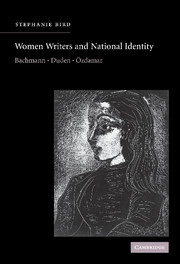Book contents
- Frontmatter
- Contents
- Acknowledgements
- Introduction
- PART I INGEBORG BACHMANN: THE TODESARTEN PROSE
- PART II ANNE DUDEN: THE SUFFERING BODY
- 4 The short stories. Thoughts on the body and ethics
- 5 Desire and complicity in Das Judasschaf
- PART III EMINE ÖZDAMAR: PERFORMANCE AND METAPHOR
- Conclusion: das war es
- Notes
- Bibliography
- Index
5 - Desire and complicity in Das Judasschaf
Published online by Cambridge University Press: 22 September 2009
- Frontmatter
- Contents
- Acknowledgements
- Introduction
- PART I INGEBORG BACHMANN: THE TODESARTEN PROSE
- PART II ANNE DUDEN: THE SUFFERING BODY
- 4 The short stories. Thoughts on the body and ethics
- 5 Desire and complicity in Das Judasschaf
- PART III EMINE ÖZDAMAR: PERFORMANCE AND METAPHOR
- Conclusion: das war es
- Notes
- Bibliography
- Index
Summary
Anne Duden's Das Judasschaf is, like Bachmann's Malina, a book of central importance to feminism. For in its exploration of subjectivity it forces a confrontation with complex issues of female identification and desire and raises the challenging problem of female complicity with oppression. It thus questions an understanding of feminism which defines the female subject in relation to an external oppressive order that denies woman her own voice, a feminism which places woman in the position of victim and thus cleanses her from responsibility for her subjectivity within the existing male economy. Das Judasschaf reveals that woman's desire situates her in a more difficult relationship to the society which oppresses her, and that acknowledgement of her own involvement in, indeed dependence upon the structures which she rejects, is crucial for understanding female subjectivity.
This interpretation of the text might be criticized as reading against the grain of the novel. Many feminist critics have implicitly accepted the narrator's perspective on her suffering and victimhood. What has been inadequately recognized is that the text manifests a fascination with violence and horror, an interest pursued to the point of indulgence. Violence is at once fantasized and suffered, and it is this relationship which must be explored before feminist interpretations of Duden can become convincing. The value of Das Judasschaf lies not only in the fact that it addresses disturbing aspects of female desire and fantasy, but that these fundamental constituents of identity are revealed as historically specific.
- Type
- Chapter
- Information
- Women Writers and National IdentityBachmann, Duden, Özdamar, pp. 124 - 154Publisher: Cambridge University PressPrint publication year: 2003



